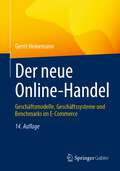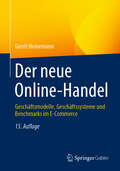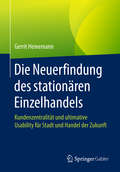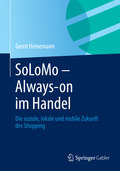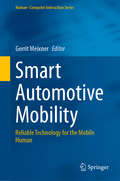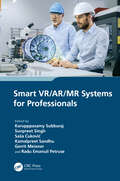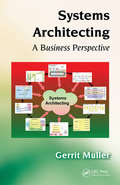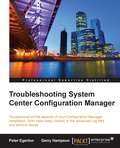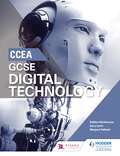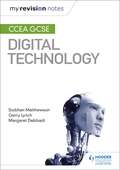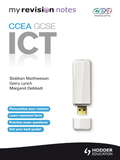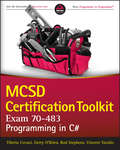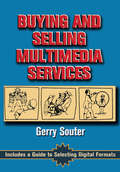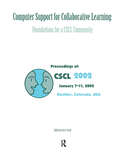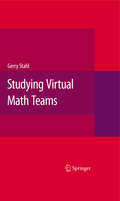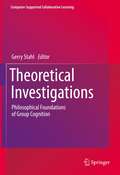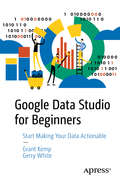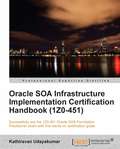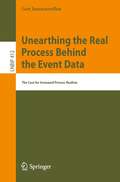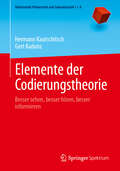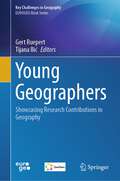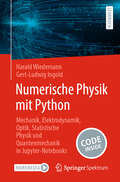- Table View
- List View
Der neue Online-Handel: Geschäftsmodelle, Geschäftssysteme und Benchmarks im E-Commerce
by Gerrit HeinemannDieses Buch präsentiert Entwicklungen und Zukunftstrends im E-Commerce, der durch die neuen digitalen Kommunikations- und Konsummuster der Kunden geprägt ist. Gerrit Heinemann beleuchtet E-Commerce-Geschäftsmodelle, Kanalexzellenz sowie Erfolgsfaktoren wie digitale Zeitvorteile und Kundenzentrierung. Er analysiert die digitalen Herausforderungen und zeigt die Konsequenzen und die mit dem Online-Handel verbundenen Chancen auf. Anerkannte Best Practices veranschaulichen, wie erfolgreicher Digital Commerce funktioniert und was die „Lessons Learned“ der letzten Jahre sind.Die 14. Auflage geht der Frage nach: Ist der Online-Boom endgültig Geschichte oder wird er wieder durchstarten nach der Krisenzeit? Wie geht es langfristig weiter? Darüber hinaus werden neue Trends (z.B. ChatGPT, neue Webdesigntrends), Änderungen im Internetrecht sowie das Thema „Insolvenzfall Online-Handel“ aufgegriffen. Zudem wurden alle Kapitel überarbeitet und neue Best-Practice-Beispiele integriert.Der Inhalt• Meta-Targeting und Geschäftsideen im Online-Handel• Geschäftsmodell des Online-Handels• Formen des Online-Handels• Geschäftssysteme und Benchmarks im E-Commerce• Best Practices und Risiken im Online-Handel
Der neue Online-Handel: Geschäftsmodelle, Geschäftssysteme und Benchmarks im E-Commerce
by Gerrit HeinemannDieses Buch präsentiert Entwicklungen und Zukunftstrends im E-Commerce, der durch die neuen digitalen Kommunikations- und Konsummuster der Kunden geprägt ist. Gerrit Heinemann beleuchtet E-Commerce-Geschäftsmodelle, Kanalexzellenz sowie Erfolgsfaktoren wie digitale Zeitvorteile und Kundenzentrierung. Er analysiert die digitalen Herausforderungen und zeigt die Konsequenzen und die mit dem Online-Handel verbundenen Chancen auf. Anerkannte Best Practices veranschaulichen, wie erfolgreicher Digital Commerce funktioniert und was die „Lessons Learned“ der letzten Jahre sind. Die 15. Auflage diskutiert umfassend die Frage: Wird der Online-Boom wieder durchstarten nach dem Dauerkrisenmodus und wie sieht es langfristig aus? Darüber hinaus werden neue Entwicklungen, wie z.B. asiatische Plattformen und der Siegeszug der fokussierten Shopping Apps (Multi-Purpose-Apps versus Multi-Experience-Apps), Änderungen im Internetrecht sowie die Themen „Online-Effizienz“ sowie „Generative KI“ aufgegriffen. Zudem wurden alle Kapitel überarbeitet und neue Best-Practice-Beispiele integriert. Der Inhalt • Meta-Targeting und Geschäftsideen im Online-Handel • Geschäftsmodell des Online-Handels • Formen des Online-Handels • Geschäftssysteme und Benchmarks im E-Commerce • Best Practices und Risiken im Online-Handel
Die Neuerfindung des stationären Einzelhandels
by Gerrit HeinemannDieses Buch geht auf die besonderen Herausforderungen an den stationären Handel im digitalen Zeitalter ein. Anliegen von Gerrit Heinemann ist es vor allem, die lokalen Händler wachzurütteln und ihnen einen Weg aufzuzeigen, wie sie sich neu erfinden können. Diese haben nur eine Zukunft, wenn es ihnen gelingt, die Chancen des Internets zu nutzen. Dabei geht es nicht nur um einen zukunftsfähigen Online-Shop und seine Verknüpfung mit dem stationären Geschäft in Form von Multi-Channel-Services, sondern vor allem auch um zukunftsfähige Konzepte für die stationären Formate, damit Sie gegen die brutale Online-Konkurrenz eine Chance haben. Der Autor erläutert, wie der stationäre Handel neu erfunden werden und sich an den vom Kunden gelernten Erfolgsprinzipien des Online-Shoppings ausrichten kann. Dazu werden auch aktuelle Veränderungen im Kundenverhalten beschrieben und neue Wege zu einer Digitalisierung der Innenstädte sowie einer Neuausrichtung der Shoppingcenter aufgezeigt. Als Vorbild dient die Umsetzung der von Amazon erfundenen Kundenzentralität sowie der ultimativen Usability für Stadt und Handel der Zukunft. Der Inhalt- Der stationäre Handel im digitalen Zeitalter- Herausforderungen des stationären Handels- Neuerfindung des stationären Handels- Digitale Innenstadt und Shoppingcenter der Zukunft- Risk-Benefit im Handel der Zukunft
SoLoMo - Always-on im Handel
by Gerrit HeinemannDas Shopping der Zukunft zeichnet sich durch ein begleitendes Zusammenspiel von sozialer Vernetzung, Lokalisierung und mobiler Internetnutzung beim Ladenbesuch aus. Dieser Dreiklang bildet die Basis für die ,,Synergien des SoLoMo", die ganz neue Möglichkeiten der Vermarktungseffizienz insbesondere für stationäre Händler erlauben. Die sich daraus ergebenden Chancen greift das vorliegende Buch auf, indem es den aktuellen Stand der Forschung und Praxis zu dem Thema darstellt und die Basisfaktoren des SoLoMo umfassend klärt. Dabei werden die Location Based Services (LBS), denen eine Schlüsselrolle im Handel der Zukunft zukommt, besonders gewichtet und mit einer empirischen Studie in Hinblick auf Nutzung sowie Potenzial am Beispiel von kaufDA erforscht. Die Ergebnisse weisen darauf hin, dass die Kunden LBS als attraktiv ansehen und bereit sind, durch sie habitualisiertes Einkaufsverhalten in Frage zu stellen. LBS befinden sich allerdings noch im Anfangsstadium und sind vom Begriff her relativ unbekannt, lassen allerdings große Potenziale erkennen.
Smart Automotive Mobility: Reliable Technology for the Mobile Human (Human–Computer Interaction Series)
by Gerrit MeixnerThis book focuses on smart results in the field of smart automotive mobility concentrating on (semi-)autonomous cars. The results are based on 5 recently finished public-funded research projects with a budget of over 15 million Euro. Providing insights into the next generation of personalized mobility on the road the authors discuss personalized, adaptive cooperative systems for highly automated cars and how they can be developed in a human-centered way. Furthermore, the book reports on a cooperative driver-vehicle interaction. How can the driver and the vehicle support each other? What are their best skills and how can they benefit from each other? It also gives novel insights on intuitive steering gestures on the steering wheel which initiate maneuvers to be executed by the automation, and to be supervised by, influenced or interrupted by the driver. The book finishes with information on a cooperative laser beam system which improves the communication between the different road participants to optimize the road safety of tomorrow. Smart Automotive Mobility: Reliable Technology for the Mobile Human is an ideal source for researchers, students and practitioners working in the area of intelligent systems for the automotive industry. It gives valuable and condensed information from multi-million Euro research projects funded by the German Federal Ministry of Education and Research.
Smart VR/AR/MR Systems for Professionals
by Gerrit Meixner Sunpreet Singh Karupppasamy Subburaj Kamalpreet Sandhu Saša Ćuković Radu Emanuil PetruseSmart VR/AR/MR Systems for Professionals is a comprehensive guide that explores the ground-breaking applications of virtual reality (VR), augmented reality (AR), and mixed reality (MR) in various industries. This book aims to equip practicing professionals with the knowledge and insights they need to harness the full potential of these immersive technologies in their respective fields. Through this book, the authors aim to explore the experimental breakthroughs and cutting-edge methodologies that have emerged in the realm of VR/AR/MR. The book delves deeper into the profound impact these technologies have had on the design process, computer-aided design, healthcare product development, manufacturing, human-robot collaboration, medical imaging, rehabilitation, and even phobia therapy. In each chapter of this book, we delve into specific topics, uncovering the principles, methodologies, and best practices that professionals can adopt. Examples of these topics range from empowering design processes with virtual reality to revolutionizing computer-aided design, and from exploring AR/VR/MR technologies in healthcare to transforming manufacturing with digital twins and metrology in VR. The book aims to provide practitioners with valuable insights, real-world examples, and practical guidance to navigate the ever-evolving landscape of VR/AR/MR systems.
Systems Architecting: A Business Perspective
by Gerrit MullerDerived from industry-training classes that the author teaches at the Embedded Systems Institute at Eindhoven, the Netherlands and at Buskerud University College at Kongsberg in Norway, Systems Architecting: A Business Perspective places the processes of systems architecting in a broader context by juxtaposing the relationship of the systems archit
Troubleshooting System Center Configuration Manager
by Gerry Hampson Peter EgertonTroubleshoot all the aspects of your Configuration Manager installation, from basic easy checks to the advanced log files and serious issues About This Book * Learn to troubleshoot Configuration Manager 2012 based versions of Microsoft System Center * Understand the usability of tools and find resolutions to all the issues of Configuration Manager * A step-by-step practical guide with the necessary screenshots and examples Who This Book Is For If you are new to Configuration Manager or have experience with it, and are interested in identifying, diagnosing and resolving the System Center Configuration Manager administration issues then this book is for you. What You Will Learn * Fix your clients and install them correctly * Understand how your Configuration Manager hierarchy works * Extend your error information * Troubleshoot Configuration Manager roles * Know your options when faced with problems * Prevent future problems occurring In Detail Microsoft System Center Configuration Manager is the most popular enterprise client management solution in the world with some of the best features available. Troubleshooting this product, however, is not always as simple as you might want, not least getting to know the hundreds of log files and understanding how the various components work. The book starts with discussing the most commonly used tools for troubleshooting the variety of problems that can be seen in Configuration Manager. It then moves to providing a high level view of the available log files, their locations, what they relate to and what they typically contain. Next, we will look at how we can fully utilize and extend all the available information from the console monitoring pane through to the status messages and down into error logging with some further reaches into WMI, SQL, registry and the file structure. You will then learn what the common error codes mean, how to make sense of the less common ones and what they actually mean with respect to Configuration Manager. Further to this, you will pick up widely acknowledged best practices both from a proactive stance when carrying out your daily administrative tasks and also from a reactive position when the green lights start to turn red right down to a complete failure situation. By the end of the book, you will be competent enough to identify and diagnose the root causes of System Center Configuration Manager administration issues and resolving them. Style and approach An easy to follow yet practical guide that will advise you on what tools and information you have available to troubleshoot with, if you can extend that information and what to look for solving the issues.
CCEA GCSE Digital Technology (CCEA GCSE Digital Technology)
by Siobhan Matthewson Gerry Lynch Margaret DebbadiExam Board: CCEALevel: GCSESubject: Digital TechnologyFirst Teaching: September 2017First Exam: June 2019This title has been written to help ensure students' successful progress through CCEA's GCSE Digital Technology specification. Our expert authors provide insight and guidance for the mandatory Digital Technology unit and each of the Multimedia and Programming optional units, and have incorporated challenging tasks and activities to test essential knowledge and skills required for the examined and controlled assessment units.- Features comprehensive coverage of the examined Digital Technology unit- Builds students' Multimedia and Programming skills and capabilities (depending on their chosen pathway) through clearly focused content and activities to assess understanding and aid progression- Provides students with contexts to apply digital technology skills- Develops problem-solving skills with selected tasks for each pathway- Helps students prepare for success in externally examined and controlled assessments with opportunities to test and consolidate understanding through each unit
CCEA GCSE Digital Technology (CCEA GCSE Digital Technology)
by Siobhan Matthewson Gerry Lynch Margaret DebbadiThis title has been written to help ensure students' successful progress through CCEA's GCSE Digital Technology specification. Our expert authors provide insight and guidance for the mandatory Digital Technology unit and each of the Multimedia and Programming optional units, and have incorporated challenging tasks and activities to test essential knowledge and skills required for the examined and controlled assessment units.- Features comprehensive coverage of the examined Digital Technology unit- Builds students' Multimedia and Programming skills and capabilities (depending on their chosen pathway) through clearly focused content and activities to assess understanding and aid progression- Provides students with contexts to apply digital technology skills- Develops problem-solving skills with selected tasks for each pathway- Helps students prepare for success in externally examined and controlled assessments with opportunities to test and consolidate understanding through each unit
My Revision Notes: CCEA GCSE Digital Technology
by Siobhan Matthewson Gerry Lynch Margaret DebbadiExam board: CCEALevel: GCSESubject: Digital TechnologyFirst teaching: September 2017First exams: Summer 2019Target success in CCEA GCSE Digital Technology, whichever route you choose, with our proven formula for effective, structured revision. Key coverage of the three examined units - Digital Technology, Digital Development Concepts and Digital Development Practice - is combined with practical tips to create a revision guide that students can rely on to review, strengthen and test their knowledge.With My Revision Notes, every student can:Consolidate subject knowledge by working through clear and focused content coverage.Test understanding and identify areas for improvement with a sample paper included within the book.Improve exam technique through tips written by leading authors and develop an understanding of assessment requirements of the examined units.Get exam ready with extra quick quizzes and answers to the practice questions
My Revision Notes: Ccea Gcse Digital Technology Epub
by Siobhan Matthewson Gerry Lynch Margaret DebbadiTarget success in CCEA GCSE Digital Technology, whichever route you choose, with our proven formula for effective, structured revision. Key coverage of the three examined units - Digital Technology, Digital Development Concepts and Digital Development Practice - is combined with practical tips to create a revision guide that students can rely on to review, strengthen and test their knowledge.With My Revision Notes, every student can:Consolidate subject knowledge by working through clear and focused content coverage.Test understanding and identify areas for improvement with a sample paper included within the book.Improve exam technique through tips written by leading authors and develop an understanding of assessment requirements of the examined units.Get exam ready with extra quick quizzes and answers to the practice questions
Revision Notes: CCEA ICT for GCSE (My Revision Notes (PDF))
by Siobhan Matthewson Gerry Lynch Margaret DebbadiRevision Notes: CCEA ICT for GCSE has been written by experienced teachers and examiners so that you can be confident that it covers only the facts and ideas you will be expected to recall and use in the exam.- Essential facts are carefully organised to make revising easier.- Exams tips show you how to avoid losing marks and get the best grade.- Check your understanding questions support you in the run-up to the exams, with answers provided free online at www.hodderplus.co.uk.This book will help you plan and pace your revision to suit your learning needs and can be integrated with other revision techniques you are using.
MCSD Certification Toolkit (Exam 70-483): Programming in C#
by Rod Stephens Tiberiu Covaci Vincent Varallo Gerry O'BrienA perfectly crafted prep guide that prepares you for the MCSD 70-483The MCSD 70-483 exam is the entry-level Microsoft certification exam for C# developers and this must-have resource offers essential coverage of the exam that will test your competency in C# programming. Each chapter covers one of the core subject domains that comprise the exam. Among the authors are experienced trainers who advised Microsoft on the development of its certification programs, affording them a unique understanding of both the objectives and what it takes to master them. This invaluable knowledge is passed to you so that you will not only be prepared to take the exam, but also become a better C# developer Features a step-by-step lab tutorial for each lesson covered in the book, encouraging you to practice what you've just learned in order to reinforce your learningIncludes an accompanying website that includes more than 100 simulated test questions and answersShares solutions to the hands-on labs presented in the bookContains complete sample codeOffers a unique author approach that not only teaches you how to answer a set of exam questions but also provides you with an understanding of the underlying concepts and skills needed to succeed as a professional C# programmerMCSD Certification Toolkit is all you need to fully prepare for exam 70-483!
Buying and Selling Multimedia Services
by Gerry SouterThis book is a comprehensive guide to buying and developing multimedia in the most cost-effective manner. Focusing on the human factors in producing multimedia, rather than just the software, Buying and Selling Multimedia Services is aimed at both buyers and sellers of multimedia services and draws on real-world anecdotes¦war stories¦from project diaries and first-hand experience, to provide examples of the key ideas delineated within the book. These are true stories culled from 25 years of working on both sides of the desk as a purchaser of creative services for a Fortune 500 company and as a producer and seller for one of the largest multimedia production shops in the country. This book helps the multimedia producer and buyer to recognize flaws in past performances and to anticipate situations in future projects in order to save money and eliminate boardroom confrontations. Accusations, altercations, and recriminations can be avoided and the bottom line enhanced with the production of an effective product targeted to a receptive audience. Souter examines the skills necessary to both the producer and the purchaser of multimedia, allowing each to see the others' problems and viewpoints. Viewing the multimedia project from both sides, as both buyer and seller, Souter highlights the issues which will allow for effective communication between parties, resulting in a better product and a more creative relationship among all involved. In the second part of the book, Souter provides a comprehensive guide to all the digital formats available, to help the buyer and the developer select the most appropriate for a given project.
Computer Support for Collaborative Learning: Foundations for A Cscl Community (cscl 2002 Proceedings)
by Gerry StahlComputer Support for Collaborative Learning (CSCL) is a field of study centrally concerned with meaning and the practices of meaning-making in the context of joint activity, and the ways in which these practices are mediated through designed artifacts. This volume includes abstracts of papers that were presented during interactive poster sessions at CSCL 2002. Documenting an extremely heterogeneous, productive phase of inquiry with broad social consequences, these proceedings reflect the current state of CSCL research--particularly in North America and Western Europe.
Studying Virtual Math Teams
by Gerry StahlStudying Virtual Math Teams centers on detailed empirical studies of how students in small online groups make sense of math issues and how they solve problems by making meaning together. These studies are woven together with materials that describe the online environment and pedagogical orientation, as well as reflections on the theoretical implications of the findings in the studies. The nature of group cognition and shared meaning making in collaborative learning is a foundational research issue in CSCL. More generally, the theme of sense making is a central topic in information science. While many authors allude to these topics, few have provided this kind of detailed analysis of the mechanisms of intersubjective meaning making. This book presents a coherent research agenda that has been pursued by the author and his research group. The book opens with descriptions of the project and its methodology, as well as situating this research in the past and present context of the CSCL research field. The core research team then presents five concrete analyses of group interactions in different phases of the Virtual Math Teams research project. These chapters are followed by several studies by international collaborators, discussing the group discourse, the software affordances and alternative representations of the interaction, all using data from the VMT project. The concluding chapters address implications for the theory of group cognition and for the methodology of the learning sciences. In addition to substantial introductory and concluding chapters, this important new book includes analyses based upon the author's previous research, thereby providing smooth continuity and an engaging flow that follows the progression of the research. The VMT project has dual goals: (a) to provide a source of experience and data for practical and theoretical explorations of group knowledge building and (b) to develop an effective online environment and educational service for collaborative learning of mathematics. Studying Virtual Math Teams reflects these twin orientations, reviewing the intertwined aims and development of a rigorous science of small-group cognition and a Web 2.0 educational math service. It documents the kinds of interactional methods that small groups use to explore math issues and provides a glimpse into the potential of online interaction to promote productive math discourse.
Theoretical Investigations: Philosophical Foundations of Group Cognition (Computer-Supported Collaborative Learning Series #18)
by Gerry StahlComputers have transformed how we think, discuss and learn—as individuals, in groups, within cultures and globally. However, social media are problematic, fostering flaming, culture wars and fake news. This volume presents an alternative paradigm for computer support of group thinking, collaborative learning and joint knowledge construction. This requires expanding concepts of cognition to collectivities, like collaborative groups of networked students. Theoretical Investigations explores the conditions for group cognition, supplying a philosophical foundation for new models of pedagogy and methods to analyze group interaction. Twenty-five self-contained investigations document progress in research on computer-supported collaborative learning (CSCL)—both in Stahl’s own research and during the first decade of the CSCL journal.The volume begins with two new reflections on the vision and theory that result from this research. Representing both ethnomethodological and social-constructivist research paradigms, the investigations within this volume comprise a selection of seminal and influential articles and critical commentaries that contribute to an understanding of concepts and themes central to the CSCL field. The book elaborates an innovative theory of group cognition and substantiates the pedagogical potential of CSCL. Theoretical Investigations: Philosophical Foundations of Group Cognition is essential as a graduate text for courses in educational theory, instructional design, learning and networked technologies. The investigations will also appeal to researchers and practitioners in those areas.
Google Data Studio for Beginners: Start Making Your Data Actionable
by Gerry White Grant KempGoogle Data Studio is becoming a go-to tool in the analytics community. All business roles across the industry benefit from foundational knowledge of this now-essential technology, and Google Data Studio for Beginners is here to provide it. Release your locked-up data and turn it into beautiful, actionable, and shareable reports that can be consumed by experts and novices alike.Authors Grant Kemp and Gerry White begin by walking you through the basics, such how to create simple dashboards and interactive visualizations. As you progress through Google Data Studio for Beginners, you will build up the knowledge necessary to blend multiple data sources and create comprehensive marketing dashboards. Some intermediate features such as calculated fields, cleaning up data, and data blending to build powerhouse reports are featured as well. Presenting your data in client-ready, digestible forms is a key factor that many find to be a roadblock, and this book will help strengthen this essential skill in your organization. Centralizing the power from sources such as Google Analytics, online surveys, and a multitude of other popular data management tools puts you as a business leader and analyzer ahead of the rest. Your team as a whole will benefit from Google Data Studio for Beginners, because by using these tools, teams can collaboratively work on data to build their understanding and turn their data into action. Data Studio is quickly solidifying itself as the industry standard, and you don’t want to miss this essential guide for excelling in it. What You Will Learn Combine various data sources to create great looking and actionable visualizationsReuse and modify other dashboards that have been created by industry prosUse intermediate features such as calculated fields and data blending to build powerhouse reports Who This Book Is For Users looking to learn Google Analytics, SEO professionals, digital marketers, and other business professionals who want to mine their data into an actionable dashboard.
Crie sua Agência de Marketing Digital
by Robinson Hardin Gerson AguilarComo crio minha agência de marketing on-line? Por onde começo? Quanto dinheiro devo ter? É o que todo empreendedor desta era digital se pediu para formar uma agência de marketing. Com as tecnologias atuais e acesso à Internet, muitas portas se abrem para nós. Um mundo cheio de possibilidades. Este livro irá ajudá-lo a conhecer um pouco mais através destas 14 dicas precisas para realizar com sua Agência de Marketing Online. Cresça, cresça sua marca, relacione-se com seus clientes, estude sua concorrência, isso e muito mais para que você possa começar a iniciar seu negócio de Marketing Digital.
Railo 3 Beginner’s Guide
by Mark Drew Gert FranzPart of Packt's Beginner's Guide series, this book uses practical examples and screenshots to steadily guide the reader through setting up and using Railo. If you want to develop your own dynamic web applications using CFML, then this book is for you. No prior experience with Railo or CFML is required, although you will be expected to have some web application development experience and knowledge of HTML.
Unearthing the Real Process Behind the Event Data: The Case for Increased Process Realism (Lecture Notes in Business Information Processing #412)
by Gert JanssenswillenThis book is a revised version of the PhD dissertation written by the author at Hasselt University in Belgium. This dissertation introduces the concept of process realism. Process realism is approached from two perspectives in this dissertation. First, quality dimensions and measures for process discovery are analyzed on a large scale and compared with each other on the basis of empirical experiments. It is shown that there are important differences between the different quality measures in terms of feasibility, validity and sensitivity. Moreover, the role and meaning of the generalization dimension is unclear. Second, process realism is also tackled from a data point of view. By developing a transparent and extensible tool-set, a framework is offered to analyze process data from different perspectives. From both perspectives, recommendations are made for future research, and a call is made to give the process realism mindset a central place within process mining analyses. In 2020, the PhD dissertation won the “BPM Dissertation Award”, granted to outstanding PhD theses in the field of Business Process Management.
Elemente der Codierungstheorie: Besser sehen, besser hören, besser informieren (Mathematik Primarstufe und Sekundarstufe I + II)
by Gert Kadunz Hermann KautschitschIm täglichen Leben sind wir zunehmend von Codes umgeben, die mathematisch konstruiert werden. Sie sind teils leicht erkennbar (Strichcode, ISBN, IBAN, QR) und teils eher verborgen (GPS, WLAN, CD, DVD). In diesem Buch werden solche Codes vorgestellt. Es wird dargelegt, wie sie aufgebaut sind, wie sie funktionieren und welche Mathematik zu ihrer Entwicklung und Anwendung notwendig ist. Die Lesenden lernen, eigenhändig Codes zu erstellen, Fehler zu erkennen und zu korrigieren:EAN, ISBN und deren Barcodedarstellung sowie die internationale Bankkontonummer IBAN werden erarbeitet.Kleine QR-Codes werden mit den vorgestellten Methoden (Paritätsprüfung, Linearcode, Polynomcode, zyklischer Code und Reed-Solomon Code) anschaulich realisiert.An der Herstellung einer Mini-CD mit einem CIRC-Code über einem kleinen Körper werden wesentliche Konstruktionsprinzipien von neuen Codes aus bestehenden Codes, wie z.B. Kürzen, Erweitern, Spreizen (Interleaving) und gekreuztes Spreizen (Cross-Interleaving) veranschaulicht.Das Verstehen von Mathematik wird durch diese selbstständige Erstellung und Verwendung didaktisch maßgeschneiderter Codes wesentlich gefördert.Ein besonderer Fokus des Buchs liegt auf elementaren Methoden des Rechnens mit ganzen Zahlen und Polynomen. Für diese benötigt man nur den Satz von der Division mit Rest als zentrale Aussage – daher können große Abschnitte bereits mit Lernenden der Sekundarstufe II erarbeitet und die Grundlagen wesentlicher Teile der Codierungstheorie von den Lernenden mathematisch korrekt erfasst werden. Für Ausführungen, zu deren Verständnis Kenntnisse notwendig sind, die über die Mathematik der Sekundarstufe II hinausgehen, liegt ein ausführlicher Anhang vor (Vektorräume, Matrizen, Rechnen in endlichen Körpern).
Young Geographers: Showcasing Research Contributions in Geography (Key Challenges in Geography)
by Gert Ruepert Tijana IlićThis book shows an updated overview of research about human geography topics like urban growth/urban challenges, transportation, landscape, land cover, geospatial analysis, regional planning/local development, cultural geography, tourism, and so on. Between 2020 and 2022, due to COVID-19 and lockdowns worldwide, there were fewer opportunities for young and upcoming researchers to present their state-of-the-art findings at conferences. In order to highlight exceptional research of young geographers during this time, the idea for this book was created. In collaboration with the EGEA alumni foundation for students and young geographers, 12 authors were selected to showcase their scientific work. In addition to that, most of them present amazing maps and figures as outstanding expression of the need of GIS for geography research.
Numerische Physik mit Python: Mechanik, Elektrodynamik, Optik, Statistische Physik und Quantenmechanik in Jupyter-Notebooks
by Harald Wiedemann Gert-Ludwig IngoldDieses Lehrbuch bietet eine Einführung in die numerische Physik anhand von physikalischen Fragestellungen aus den Grundgebieten der Theoretischen Physik im Bachelorstudium und lädt ein, in Python mit den vorkommenden Problemparametern zu experimentieren. Besonderheiten: Der Streifzug durch die computergestützte Physik wiederholt jeweils den theoretischen Hintergrund, bevor das Programmieren im Vordergrund steht und schließt mit Übungen ab. Studierende können so Gelerntes im Grundstudium vertiefen. Für Lehrende ist dieses Buch eine vielfältige Quelle für Ergänzungen Ihrer Vorlesungen. Alle besprochenen Programme stehen zum Download bereit. Der Inhalt 1. Erste Schritte mit Python und Jupyter-Notebooks - 2. Mechanik von Punktmassen - 3. Elektrodynamik und Optik - 4. Statistische Physik - 5. Quantenmechanik - 6. Praktische Aspekte von Python Die Zielgruppe: Physikstudierende sollten dieses Buch als Begleiter im Bachelorstudium nutzen. Lehrende können die Möglichkeiten der Simulation physikalischer Systeme zeigen. Ebenso profitieren Studierende der Ingenieurwissenschaften, der Informatik und einfach alle mit Interesse an computergestützter Physik von den vielfältigen Beispielen - egal ob im Bachelor, Master oder darüber hinaus. Vorkenntnisse: Grundkenntnisse in der Programmierung in Python werden vorausgesetzt. Ebenso sollte die thematisierte Physik aus der entsprechenden Vorlesung oder einem Lehrbuch prinzipiell bekannt sein.
